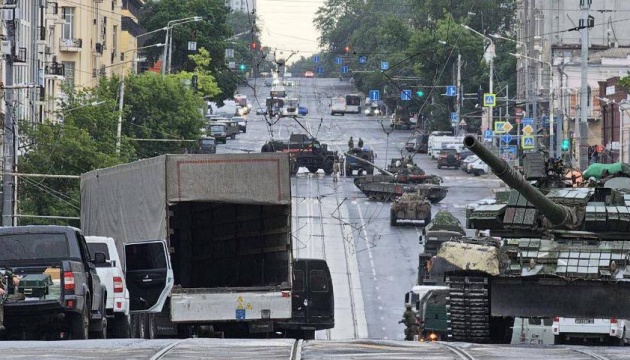RUSSIAN OFFENSIVE CAMPAIGN ASSESSMENT, JUNE 24, 2023

Russian Offensive Campaign Assessment, June 24, 2023
Kateryna Stepanenko, Karolina Hird, Riley Bailey, Angelica Evans, and Mason Clark
June 24, 2023, 10pm ET
The Kremlin announced late on June 24 that Belarusian dictator Alexander Lukashenko negotiated a deal under which Wagner Group financier Yevgeny Prigozhin will travel to Belarus without facing criminal charges in Russia; some portion of Wagner Group fighters will sign contracts with the Russian Ministry of Defense (MoD); and no Wagner personnel will be charged for their involvement in an armed rebellion. Kremlin spokesperson Dmitry Peskov announced that Russian authorities will drop the criminal case against Prigozhin and that Prigozhin will go to Belarus, thanking Lukashenko for his role in mediating the deal with the “higher goal to avoid bloodshed.”[1] Lukashenko’s press service earlier broke the news about the deal, reporting that Lukashenko negotiated with Prigozhin and claiming that Lukashenko and Putin agreed to undertake “bilateral actions” to resolve the crisis earlier in the day.[2] Lukashenko stressed the importance of avoiding a ”bloody massacre” and ensuring security guarantees for Wagner fighters.[3] Prigozhin released an audio message after the initial Belarusian report, claiming his “march for justice” achieved its goal and that he ordered Wagner forces back to their training grounds to prevent the situation from turning bloody (after Wagner forces already killed over a dozen Russian personnel).[4] Prigozhin notably did not mention Lukashenko‘s involvement or the details of any negotiated deal in his own statement.
- The specifics of the deal, how and on what timeline it will be implemented, the expected outcomes for each party, and the extent to which all involved parties will follow the agreement, remain unclear at this time.
- Russian sources were quick to emphasize that Wagner’s armed rebellion did not impact Russian forces in Ukraine, but Wagner’s actions demonstrated Russia’s lack of reserves in rear areas.
- The Lukashenko-brokered agreement will very likely eliminate Wagner Group as a Prigozhin-led independent actor in its current form, although elements of the organization may endure under existing and new capacities
- Russian forces launched their largest series of missile strikes against Ukraine in recent months on June 24, despite the armed rebellion within Russia.
Latest fromISW
Russian Offensive Campaign Assessment, June 25, 2023
Jun 25, 2023 - Press ISW
Russian sources speculated on the specifics of the deal mediated by Belarusian dictator Alexander Lukashenko to end the Wagner Group’s June 23-24 armed rebellion, including the possible involvement of Russian President Vladimir Putin’s chief of staff. Russian opposition outlet Meduza, citing unnamed internal Kremlin sources, reported that Prigozhin initially tried to get in touch with the Russian Presidential Administration midday June 24 as Wagner fighters moved north from Rostov-on-Don towards Moscow, but that Putin refused to speak with Prigozhin. Meduza noted that, once Prigozhin observed the lack of widespread military support for Wagner’s actions and changed his mind on Wagner’s prospects, the Kremlin turned to negotiations involving Lukashenko, Chief of Staff of the Russian Presidential Office Anton Vaino, and Russian Ambassador to Belarus Boris Gryzlov. Vaino and Gryzlov’s possible involvement was not reported on June 24. A prominent Kremlin-affiliated milblogger also questioned whether the deal will hold Wagner or Prigozhin accountable in any way for the deaths of at least 13 Russian airman on June 24. Prigozhin’s whereabouts cannot be verified beyond his departure from Rostov-on-Don late on June 24. Russian outlet RTVI claimed that Prigozhin’s press service told RTVI that Prigozhin “sends his regards” and will answer all questions “when he is on normal communication,” and a prominent Wagner-affiliated Telegram channel shared an AI-generated image of Prigozhin holding a finger to his lips and stating “plans love silence,” a copy of the phrase commonly used in Ukraine about operational security. As ISW noted on June 24, the specifics of the deal are still unclear in the open source beyond speculation and rumor. The fallout of Wagner’s armed rebellion has not yet concluded, and it remains to be seen how the deal will be implemented, if all involved parties will comply fully, how the Kremlin and Russian Ministry of Defense (MoD) intend to do with Wagner personnel - and if Wagner fighters will cooperate, regardless of Prigozhin’s wishes.
The ISW is not forecasting an imminent collapse of the Russian government but believes that Prigozhin’s rebellion and the resolution of the events of June 23 and 24 will likely substantially damage Putin’s government and the Russian war effort in Ukraine.




No comments:
Post a Comment